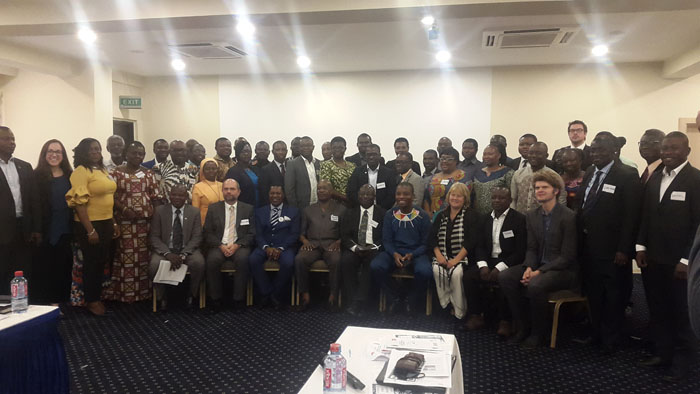The participants in a group photograph after the opening
Stakeholders in the healthcare delivery system have begun a two-day policy dialogue on finding alternative ways of financing healthcare system in Ghana so everyone can have access to affordable services.
The dialogue, organised in collaboration with UT Berlin, Germany, themed: ‘Rethinking Healthcare Purchasing In Ghana, Balancing Needs, Quality & Financial Sustainability’, was to help address current technical issues and challenges facing healthcare financing in the country.
It was also to create the platform for information exchange and consensus building between the public, private and civil society organisations through leaders who can forge alliances and make decisions or strongly influence the trajectory of a possible solution to challenging issues in the health sector.
The Minister of Health, Kwaku Agyeman-Manu, in a speech read on his behalf by the director of Policy, Planning & Evaluation, Dr. Emmanuel Odame, said although Ghana has seen remarkable improvement in terms of performance such as increase in government allocation, improved performance in child health and increased coverage of health insurance, the holistic assessment for the past three years had showed stagnated performance of the sector, which includes the National Health Insurance Scheme (NHIS).
“The scheme is threatened by inadequate fund which has resulted in indebtedness to service providers,” Dr. Odame stated.
He indicated that increase coverage without a corresponding increase in resources or premiums has created a significant financial burden on the scheme.
For instance, increased membership coverage has led to claims payments increasing from GH¢ 7.60 million in 2005 to GH¢ 1.14 billion in 2017.
“As of April 2017, the NHIS owed its healthcare providers an estimates amount of GH¢1.2 billion. It is significant to mention that about 30 per cent of NHIS members pay premiums to the scheme, accounting for less than five per cent of the total revenue of NHIA. The increasing claims cost has resulted in significant delays in payment of provider claims in recent years,” he added.
The director of policy explained that as a result, some service providers are asking patients to pay out of pocket and in some cases NHIS card holders who are unable to pay are denied healthcare services.
“This has necessitated the call for a sustainable way of financing the scheme,” he stated.
Prof. Anthony Kwaku Edusei, coordinator of the capacity building project, in an interview with DAILY GUIDE said the shift in provider payment method raised issues about its potential impact on patient-provider trust relationship and insured-patients’ trust in the scheme.
“This development mean that a more integrated approach to development are required which is a clear indication that something different must be done immediately to rectify these issues if Ghana is to make strides in the Sustainable Development Goal 3 ensure healthy lives and promote well-being for all at all ages,” he indicated.
By Jamila Akweley Okertchiri


